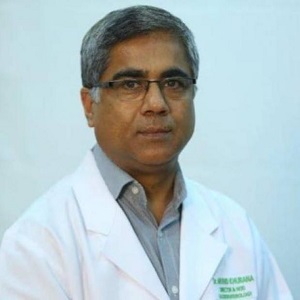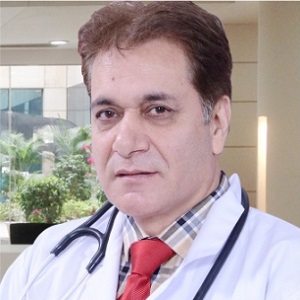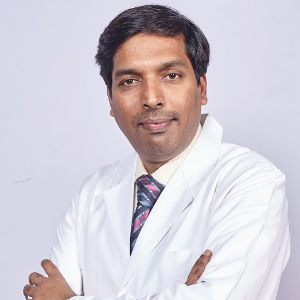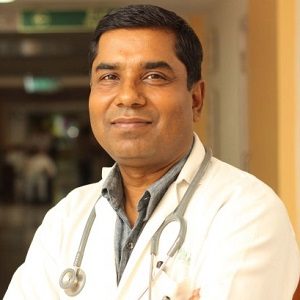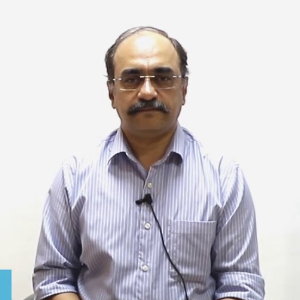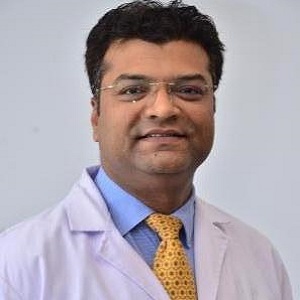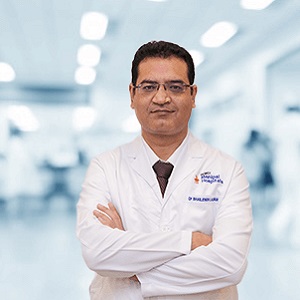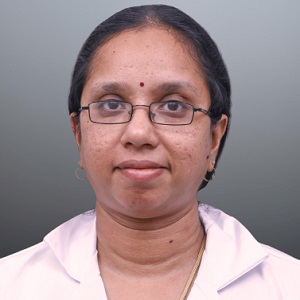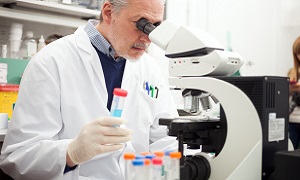Best Doctors in India for Wilson's Disease Treatment
- Gastroenterologist, Gurugram, India
- Over 33 years’ experience
Profile Highlights:
- Dr. Arvind Kumar Khurana is a well-known name in the field of gastroenterology and has a keen interest in Gastroenterology, Hepatology, Endoscopy, Onco-Gastroenterology, and Endoscopic Ultrasound.
- Dr. Khurana has successfully performed over 1,50,000 Endoscopic procedures, including over 20000 cases of EPT/CBD stones removal & Biliary Stenting, 2000 metallic stenting, 950 cases of foreign body removal, and 2000 PEG cases.
- Gastroenterologist, Gurugram, India
- Over 17 years’ experience
Profile Highlights:
- Dr. M A Mir is a well-known Gastroenterologist and Endoscopist with a vast experience of more than 17 years in the field of Gastroenterology.
- Before joining Artemis Hospital he was associated with Pushpawati Singhania Research Institute for Liver and Digestive Diseases, New Delhi as a Consultant Gastroenterologist and Endoscopist.
- He is experienced in all gastrointestinal procedures such as diagnostic and therapeutic upper and lower GI endoscopies.
- Liver Transplant & HPB Surgeon, Gurugram, India
- Over 20 years’ experience
Profile Highlights:
- Dr. Ajitabh Srivastava is a reputed HPB and Liver Transplant surgeon in India.
- He has been a key member of teams that performed over 1500 liver transplants including living donors, deceased donors, pediatric transplants, and combined liver and kidney transplants.
- He is an expert in other complex procedures involving hepatobiliary surgery, combined liver, and Kidney Transplant, and vascular access surgery.
- Gastroenterologist & Hepatologist, New Delhi, India
- Over 30 years experience
Profile Highlights:
- Dr. Amitabha Dutta is a renowned Gastroenterologist and Hepatologist with 10 years of experience as a specialist. He has more than 30 years of professional experience in gastroenterology and general medicine.
- After practicing for 10 years in the UK, Dr. Dutta relocated to India and joined Apollo Hospitals in 1995. He was the one to set up the Gastroenterology department at Apollo Hospital, and he continues to work as a senior consultant in the Department of Gastroenterology and Hepatology at Indraprastha Apollo Hospital.
- Dr. Amitabha Dutta offers non-surgical treatment for various issues ranging from piles, skin tags, and acidity to Ulcerative Colitis and the current Coronavirus outbreak.
- He got MRCP certification from The Royal College of Physicians Of Ireland.
- Surgical Gastroenterologist, Liver Transplant Surgeon, New Delhi, India
- Over 18 years experience
Profile Highlights:
- Dr. Neerav Goyal is one of the best Liver transplant surgeons in India. He is the Head of the Apollo Liver Transplant, Hepatobiliary, and Pancreatic Surgery unit in New Delhi.
- Dr. Neerav Goyal is providing the best care to patients with Hepatectomy/ liver transplant in case of liver cancer or liver cirrhosis, surgeries for pancreatic cancer, etc.
- He is a Gold Medalist practitioner who performs complex surgeries with success.
- Dr. Goyal has performed over 2100 liver transplants in his 18 years of experience. This also includes 500+ cadaver liver transplants and 220 pediatric liver transplants.
- Gastroenterologist and Hepatologist, New Delhi, India
- Over 24 years’ experience
Profile Highlights:
- Dr. Abhishek Deo is one of the finest Gastroenterologists and Hepatologists in India with an outstanding experience of over 24 years.
- His clinical proficiency lies in the field of Gastroenterology, Liver Disease, Diagnostic Therapeutic Endoscopy, and Advanced Therapeutic Endoscopy procedures.
- After completing the initial 14 years of working hand-in-hand with the top gastroenterologists in UK, he returned back to India in 2010 and started his practice in Gastroenterology and General Medicines.
- Medical Gastroenterologist, Hepatologist, New Delhi, India
- Over 35 years experience
Profile Highlights:
- Dr. Sanjay Sikka is a general physician who specializes in medical gastroenterology. He is a gastroenterologist and hepatologist with over 32 years of experience in liver disease, therapeutic endoscopy, and gastrointestinal consultations.
- Dr. Sikka is practicing as a senior consultant in the Gastroenterology department at Indraprastha Apollo Hospitals, New Delhi.
- Being Professor at the GSUM Medical College in Kanpur, Dr. Sanjay Sikka was also involved in scholarly activity. He has several papers that appeared in numerous national and international periodicals.
- Liver Transplant Surgeon & HPB Surgeon, New Delhi, India
- Over 20 years’ experience
Profile Highlights:
- Dr. Bhushan Bhole is a well-known Liver Transplant Surgeon & HPB Surgeon who has done Advanced Fellowship in Liver Transplantation & Fellowship in Advanced Laparoscopic Surgery, in Birmingham, UK.
- He is an active member of several national surgical associations such as ASI, IASG, IHPBA, ACRSI, MAS, IAGES, IHA & IMA. He has also been awarded many fellowships like FACRSI, IAGES & FMAS.
- Liver Transplant Surgeon & HPB Surgeon, New Delhi, India
- Over 19 years’ experience
Profile Highlights:
- Dr. Shailendra Lalwani is a renowned gastroenterologist at Manipal Hospitals, Dwarka, New Delhi, who has over 19 years of experience as a specialist. His expertise lies in Liver Transplantation and Hepato-pancreatic biliary surgery.
- For his outstanding contributions to the field of gastroenterology, Dr. Shailendra Lalwani has been honored with several awards and recognition. He is also an active member of the Delhi Medical Council.
- Gastroenterologist, Chennai, India
- Over 13 years’ experience
Profile Highlights:
- Dr. M Tarakeshwari is a well-known gastroenterologist who provides various services to her patients and is an expert in cytokines in IBS, treating Hepatitis B in pregnancy as well as renal failure in Cirrhosis.
- Some of the services provided by the Dr. M Tarakeshwari are: Acidity Treatment, Gallbladder (Biliary) Stone Treatment, Bladder Cancer Surgery, Inflammatory Bowel Disease (IBD) Treatment Ulcerative Colitis Treatment, etc
Best Hospitals in India for Wilson's Disease Treatment
Rela Hospital, Chennai
- City: Chennai, India
Hospital Highlights:
- RIMC is a multi-specialty hospital in a sprawling area of 36 acres located in Chromepet, Chennai, Tamil Nadu, India.
- The facility has 450 beds including 130 critical care beds, 9 operating rooms, modern reference laboratories and radiology services, and is conveniently located near road, rail and air transportation.
- RIMC is led and managed by world-renowned physicians committed to healthcare.
- RIMC offers the broadest range of clinical care, education, and research. The hospital offers state-of-the-art technology and modern treatment facilities designed to provide health care at an affordable cost.
- Rela Institute is driven by patient needs, comfort and confidence.
CARE Hospitals, Hyderabad
- City: Hyderabad, India
Hospital Highlights:
- CARE Hospitals were established in the year 2000, by CARE Group.
- The multispecialty hospital has 435 beds, including 120 critical care beds, with an annual inflow of 180000 outpatients and 16,000 in-patients.
- The hospital provides specialty medical services in Cardiology, Cardiothoracic Surgery, Pediatric Cardiology, Pediatric Cardiothoracic Surgery, Neurology, Neurosurgery, Nephrology, and Urology.
- The hospital has the first dual source, 128 slice CT scanner (for high precision cardiac imaging) – the first of its kind in south India.
- The hospital offers a wide range of accommodation facilities for the convenience of its varied patient base, ranging from general wards to super deluxe rooms.
Fortis Hiranandani Hospital, Mumbai
- City: Mumbai, India
Hospital Highlights:
- Fortis Hiranandani hospital was established in 2007.
- The hospital is an advanced tertiary care, multi-specialty hospital equipped with 149 beds.
- The hospital is equipped with a super ICU to provide emergency medical care to critically ill patients.
- The hospital is NABH accredited.
- The critical care facility in the hospital is augmented with the state-of-the-art facilities that facilitate speedier diagnosis and efficient monitoring.
- The hospital provides specialty medical services in cardiology, orthopedic science, pediatric science, neurology, diabetic care, urology, nephrology, ENT, obstetrics, gynecology, cosmetic surgery, bariatric surgery, neuro and spine care.
Fortis Hospital, Anandpur, Kolkata
- City: Kolkata, India
Hospital Highlights:
- Fortis Hospital, Anandapur, Kolkata is a world-class super-speciality equipped with the latest technologies in the medical world.
- The hospital is NABH accredited.
- This state-of-the-art facility specializes in cardiology and cardiac surgery, urology, nephrology, neurosciences, orthopaedics, digestive care, emergency care and critical care.
- The hospital, governed by integrated Building Management System (IBMS), has a pneumatic chute system, for quick vertical and horizontal transportation between floors, facilitating speedy transfer of patient specimens, documents, reports, and medicines to the concerned departments.
- The hospital also has a nephrology department with over 28 advanced dialysis units.
Fortis Hospital Banerghatta, Bengaluru
- City: Bengaluru, India
Hospital Highlights:
- Fortis Hospital Bannerghatta, Bengaluru was established in 2006.
- The hospital is a 276 bedded multi-specialty tertiary care facility.
- The hospital specializes in cutting-edge medical technology and dedicated patient care services.
- The hospital is equipped with state-of-the-art technologies like trans-radial angioplasty, trans-abdominal cardiac surgery, and computerized TKR navigation surgery.
- The hospital provides specialty medical services in cardiology, cardiac surgery, orthopedics, neurology, neuro-surgery, GI, and Minimal Access Surgery (MAS).
Gleneagles Global Hospital, Parel, Mumbai
- City: Mumbai, India
Hospital Highlights:
- Gleneagles Global Hospital The 450-bed facility comprises of 17-stories, housing state-of-the-art infrastructure, and advanced medical care facilities.
- The hospital offers end-to-end clinical, surgical, and diagnostic services. It is equipped with a team of eminent medical professionals aided by qualified nurses and medical staff
- The Hospital offers advanced Endoscopic procedures, Hepatobiliary and Liver Surgeries, Surgical and Medical Gastroenterology, Bariatric Surgery, and Robotic surgery.
- The hospital is a center of excellence for Orthopedics, Joint Replacement, Knee Replacement, and Hip Replacement surgery.
Jaypee Hospital, Noida
- City: Noida, India
Hospital Highlights:
- Jaypee Hospital is the flagship hospital of the Jaypee Group.
- This hospital has commissioned 525 beds in the first phase and has been planned and designed as a 1200 bedded multi-specialty facility.
- It holds the accreditation of the NABH and NABL.
- The hospital has state-of-the-art infrastructure equipped with the latest technologies and modern equipment like 64 Slice PET CT, Dual Head 6 Slice SPECT CT, Gamma Camera, and Da Vinci Robotic Surgery for comprehensive robotic surgical solutions.
- It has special Centers dedicated to the major specialties to provide hassle-free and high-quality clinical care.
Manipal Hospital, Dwarka, Delhi
- City: New Delhi, India
Hospital Highlights:
- Manipal Hospitals, Dwarka, is a super-specialty hospital in Dwarka, New Delhi, which is a part of Manipal Hospitals Group.
- The hospital aims to provide the best treatment on par with international standards at a fraction of the cost.
- Equipped with 380 beds, the hospital is also one of the new age hospitals which are equipped fully with state-of-the-art infrastructure, cutting-edge technology as well as the latest and advanced clinical practices. The hospital also has 13 modular Operation theatres with 118 beds which are solely meant for critical care.
- The hospital comprises internationally acclaimed doctors and highly professional and experienced hospital and medical staff who are able to provide preventive, therapeutic, and diagnostic services all under one roof.
Paras Hospital, Gurugram
- City: Gurugram, India
Hospital Highlights:
- Paras hospital was established in 2006 and is the 250 bedded flagship hospital of Paras Healthcare.
- The is supported by a team of doctors of international and national repute.
- The hospital is NABH accredited and also the first hospital in the region to have a NABL accredited laboratory.
- The hospital provides specialty medical services in around 55 departments including Neurosciences, Joint Replacement, Mother & Child Care, Minimal Invasive Surgery, Gynecology and Obstetrics, Ophthalmology, Dermatology, Endocrinology, Rheumatology, Cosmetic and Plastic surgery.
- The hospital is equipped with state-of-the-art technologies.
S L Raheja Hospital, Mahim, Mumbai
- City: Mumbai, India
Hospital Highlights:
- SL Raheja hospital is a 140-bed multi-specialty tertiary care hospital that is being managed by Fortis Healthcare Ltd.
- The hospital is a benchmark in healthcare and medical facilities in the neighborhood of Mahim & the western suburbs.
- L.Raheja Hospital, Mahim has one of the most effective ICU and Casualty care services.
- The hospital provides specialty medical services in Cardiology, Oncology, Neurology, Orthopedics, Mother & Child Care, and in Diabetes.
Wilson’s disease
Wilson’s disease is a rare inherited disorder which can cause copper to accumulate in your brain, liver, and other vital organs. Most people with this condition are diagnosed between the ages of 5 and 35, though it can sometimes even affect older people. The condition is known to affect 1 to 30,000 people worldwide.
In a healthy body, the liver filters out any excess copper and releases it through urine. However, in people having Wilson’s disease, the liver is unable to remove the extra copper properly. The extra copper then builds up in organs like the brain, the liver, and the eyes.
In order to stop the progression of the condition, early diagnosis is crucial. Delaying treatment or not receiving it, can lead to brain damage, liver failure, or other life-threatening conditions.
Symptoms
Wilson’s disease can be present at birth, but signs and symptoms generally appear only after the copper builds up in the brain, liver, or other organs. Signs and symptoms can vary depending on the parts of your body, which are affected by the condition.
Some of the symptoms can include:
- Fatigue
- A yellowing of the skin as well as the whites of the eye
- Fluid buildup in the legs or abdomen
- Golden-brown eye discoloration
- Problem speaking or swallowing or physical coordination
If you experience any symptoms that worry you, you should consider seeing your doctor.
Causes
Wilson’s disease is inherited as an autosomal recessive trait. This means that in order to develop the disease, you must inherit a copy of the defective gene from each parent. If you receive only one of the genes, you will not get ill yourself, though you will become a carrier and can pass on the gene to your child.
You are at an increased risk of having this condition if your parents or siblings have it.
Diagnosis
Diagnosing Wilson’s disease can be a challenge. This is due to the fact that the signs and symptoms are quite hard to tell from those of other liver diseases, like hepatitis. Symptoms may evolve over time as well. Doctors can use a combination of symptoms and multiple test results to make and confirm a diagnosis.
Some of the tests and procedures that might be used include:
Blood and urine tests
Biopsy
Eye exam

Genetic testing
Treatment
First, your doctor might recommend medications that are known as chelating agents, which are able to bind copper and then prompt the organs to release it into your bloodstream. This copper is then filtered by the kidneys, after which it is then released into your urine.
Medications
Liver transplant
However, if your liver damage is quite severe, then you might need a liver transplant. A transplant involves your diseased liver being replaced by your surgeon, with a healthy liver from a donor.
Transplanted livers generally come from donors who have died. But sometimes, it can also come from a living donor, such as a family member. In such cases, the diseased liver is removed and replaced with a portion of the donor’s liver.
Complications
If left untreated, Wilson’s disease can be quite fatal. Some of the complications it can cause include-
- Cirrhosis: As the liver cells try to repair any damage which was done by too much copper, scar tissue can form in the liver.
- Liver Failure: This can occur suddenly, or may develop over the years slowly. A liver transplant might be a treatment option if so is the case.
- Kidney problems: Wilson’s disease can damage your kidneys and lead to problems, such as kidney stones as well as an abnormal number of amino acids excreted in the urine.
- Persistent neurological problems: Tremors, involuntary muscle movements, clumsy gait as well as speech difficulties generally improve with treatment for Wilson’s disease. Some people, however, suffer persistent neurological difficulty despite treatment.
- Psychological problems: These can include personality changes, irritability, depression, bipolar disorder, or even psychosis.
- Blood Problems: Blood problems may include the destruction of red blood cells or hemolysis, which can lead to anemia and jaundice.

